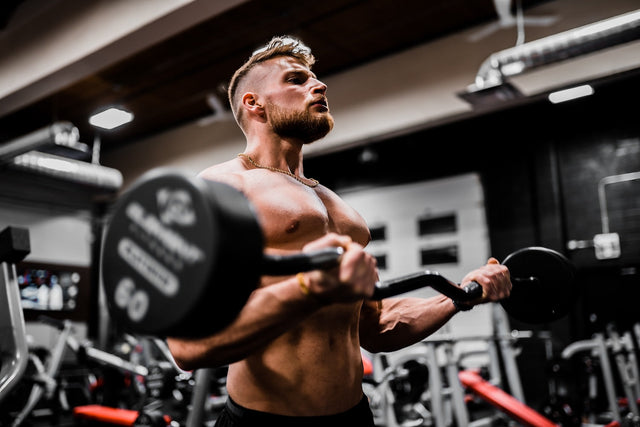Are you ready to unlock your glutes and elevate your fitness game? The hip thrust machine is your secret weapon for sculpting strong, powerful glutes that not only look great but also enhance your athletic performance. In this ultimate guide, we'll break down everything you need to know about mastering this essential piece of equipment. From proper form and technique to targeted workout variations, you'll learn how to maximize gains and unleash the full potential of your lower body. Whether you're a gym novice or a seasoned athlete, the hip thrust machine is your ticket to achieving that coveted glute strength and shape.
Dive in with us and discover the transformative power of effective hip thrusts, because strong glutes are not just about aesthetics—they're key to overall fitness, posture, and even injury prevention. Get ready to power up your workouts and unlock the best version of yourself!
Understanding the Hip Thrust Machine
What Is a Hip Thrust Machine?
The hip thrust machine is a gym tool specifically engineered to target and develop your glutes. Unlike traditional free-weight movements like barbell hip thrusts, this machine provides:
-
A stable platform for your upper back
-
A resistance mechanism—either plate-loaded or selectorized
-
Controlled range of motion for better isolation
This design minimizes the use of other muscle groups (like hamstrings and lower back) and maximizes glute engagement, specifically the gluteus maximus, medius, and minimus.
Why It’s Effective
-
Consistent Resistance: The machine keeps resistance even throughout the rep, making it easier to challenge the glutes.
-
Progressive Overload: You can gradually increase the weight to stimulate hypertrophy and strength.
-
Injury Prevention: Built-in support helps maintain proper form, reducing the risk of injury.
-
User-Friendly: Ideal for both beginners and advanced lifters, it requires minimal setup or instruction.
Who Should Use It?
The hip thrust machine benefits a wide range of users:
-
Athletes needing explosive power and hip extension
-
Bodybuilders focused on glute hypertrophy
-
Beginners who want to safely isolate their glutes
-
Post-rehab clients looking to regain hip strength and balance
Its intuitive design allows just about anyone to confidently include it in their training routine.
Benefits of Hip Thrusts for Glute Development
1. Superior Glute Activation
Hip thrusts are one of the most effective movements for glute engagement.
“Studies have shown that hip thrusts activate the gluteus maximus to a greater extent than many other lower body exercises, such as squats and deadlifts” (Contreras et al., Journal of Applied Biomechanics).
This intense activation is key for developing glute strength and size—especially when compared to compound lifts that distribute the load across multiple muscle groups.
2. Enhanced Hip Extension
Hip thrusts improve hip extension, a crucial component of:
-
Sprinting
-
Jumping
-
Olympic lifting
-
General athletic performance
Strengthening the glutes means better speed, explosiveness, and power in nearly every sport or functional movement.
3. Postural Benefits and Lower Back Support
Strong glutes are critical for:
-
Pelvic stabilization
-
Proper spine alignment
-
Reducing lower back strain
By improving glute strength, hip thrusts can help prevent injuries, particularly in the lumbar spine.
4. Promotes Glute Hypertrophy (Muscle Growth)
The hip thrust machine enables high-tension, glute-specific loading. This is essential for muscle growth.
“Mechanical tension is the primary driver of hypertrophy, especially when resistance is progressively overloaded across sessions” (Schoenfeld, Strength and Conditioning Journal).
Using the machine allows you to control tempo, add resistance, and isolate the glutes with precision—making it one of the best hypertrophy tools for the posterior chain.
5. Corrects Muscle Imbalances
Many lower body exercises (e.g., squats, lunges) engage dominant muscle groups first—like the quads. Hip thrusts place primary focus on the glutes, helping:
-
Reduce quad dominance
-
Correct muscular asymmetries
-
Create a more balanced, symmetrical physique
This is particularly beneficial for athletes and lifters who want better hip alignment, joint health, and aesthetics.
Proper Form and Technique for Maximum Effectiveness
How To Do Hip Thrusts Step-by-Step Setup
To get the most out of hip thrusts, it’s critical to set up properly on the machine:
-
Upper Back Support
Rest your upper back against the machine’s padded bench. -
Foot Placement
Keep your feet flat on the floor, shoulder-width apart. -
Hip Alignment
The bar or lever should sit comfortably across your hips. Hold it securely with both hands. -
Knee Angle
Your knees should be bent at approximately 90 degrees at the top of the movement, ensuring your shins remain vertical.
This positioning maximizes glute engagement and minimizes compensation from the lower back or hamstrings.
Execution: The Hip Thrust Movement
-
Initiate by Driving Through the Heels
Squeeze your glutes as you push your hips upward. -
Neutral Spine and Chin Tuck
Keep your chin tucked slightly and spine neutral to protect your back. -
Top Position
At the top, your torso and thighs should form a straight line from shoulders to knees. Pause briefly to fully contract the glutes. -
Controlled Descent
Lower your hips slowly and under control, maintaining tension in your glutes throughout.
Pro Tips
-
Avoid overarching the lower back.
-
Maintain a strong mind-muscle connection with your glutes.
-
Execute every rep with control—no jerky movements.
Common Mistakes to Avoid When Using the Hip Thrust Machine
1. Using Too Much Weight Too Soon
Jumping straight to heavy loads before mastering form is a common misstep. This can:
-
Compromise technique
-
Reduce glute activation
-
Increase injury risk
Start light and increase resistance only when you’ve nailed proper form.
2. Incorrect Foot Placement
Foot placement directly affects glute targeting. Mistakes include:
-
Feet too far forward or back, shifting tension away from the glutes
-
Knees caving in or flaring out, increasing joint stress
Fix it: Ensure shins are vertical at the top and push through your heels.
3. Relying on Momentum
Explosive or jerky movements reduce glute tension and increase injury risk. Instead:
-
Move slowly and deliberately
-
Engage your core to stabilize your pelvis and spine
-
Focus on glute-driven motion, not momentum
How to Incorporate Hip Thrusts into Your Workout Routine
Frequency and Programming
For best results, perform hip thrusts:
-
1–2 times per week
-
Beginner: 2–3 sets of 8–12 reps
-
Advanced: 3–4 sets of 6–10 reps with heavier weights
Tailor sets and reps based on your experience level and training split.
Pairing With Other Exercises
Build a complete lower-body routine by combining hip thrusts with:
-
Squats
-
Lunges
-
Deadlifts
-
Glute bridges
-
Kickbacks
-
Leg presses
This ensures balanced development across all major leg and glute muscles.
Apply Progressive Overload
For continuous growth, use progressive overload strategies:
-
Gradually increase resistance
-
Add more sets or reps
-
Introduce tempo changes or advanced variations
This keeps your muscles adapting and prevents plateaus.
Variations of Hip Thrusts to Challenge Your Muscles
1. Single-Leg Hip Thrust
A unilateral movement that:
-
Targets each glute individually
-
Corrects strength imbalances
-
Enhances muscle coordination
How to do it: Extend one leg out while performing the thrust with the opposite leg.
2. Banded Hip Thrust
Adding a resistance band around your thighs:
-
Increases glute medius and minimus activation
-
Improves hip stability
-
Encourages constant tension throughout the rep
Tip: Push knees outward against the band for max effect.
3. Barbell Hip Thrust
A more advanced variation that allows for:
-
Significant weight progression
-
Enhanced strength and hypertrophy
-
Freedom from machine limitations
Setup: Place a barbell across your hips, pad it for comfort, and perform the standard thrust with control and glute focus.
The Role of Nutrition in Achieving Glute Gains
Protein: The Foundation of Muscle Growth
To build and maintain muscle, especially in the glutes, consuming enough protein is essential. Protein supplies the amino acids needed for muscle repair, recovery, and growth.
-
Include high-quality protein with every meal:
Lean meats, fish, eggs, dairy, legumes, or Swolverine's Plant Protein -
Supplement with Swolverine Whey Isolate or Swolverine Clean Carbs + Protein Stack for quick recovery support
Carbohydrates: Fuel for Performance
Carbs are your primary energy source during training and key for glycogen replenishment post-workout.
-
Focus on complex carbs: whole grains, fruits, vegetables, legumes
-
Pair carbs + protein after your workout to maximize muscle recovery and growth
Post-workout examples:
-
Whey Protein Isolate with banana
-
Greek yogurt and berries
-
Chicken and quinoa salad
Healthy Fats and Hydration
Fats help regulate hormones and protect joints:
-
Add avocados, nuts, seeds, olive oil, and fatty fish
-
Stay hydrated with 8–10 glasses of water daily
-
Use Swolverine INTRA or Hydration + Electrolyte Powder to replenish fluids and minerals post-workout
By prioritizing protein, carbs, fats, and hydration, you create an ideal internal environment to support glute hypertrophy and recovery.
Tracking Progress: How to Measure Your Glute Development
1. Progress Photos
Take photos every 4–6 weeks (front, side, back) under consistent lighting and clothing. This gives you a visual timeline of glute growth and physique changes.
2. Body Measurements
Use a flexible measuring tape to track:
-
Hip circumference
-
Glute width and roundness
-
Thigh development
Record these metrics every 2–4 weeks to observe trends.
3. Strength Tracking
Track performance and load progression in your workouts:
-
Log hip thrust weight, reps, and sets
-
Use Swolverine Creatine Monohydrate to support power output and progressive overload
4. Athletic Assessments
Try:
-
1-rep max (1RM) hip thrusts
-
Vertical jump height
-
Sprint acceleration
These test how glute strength translates to functional performance.
Frequently Asked Questions About the Hip Thrust Machine
Q: Can beginners use the hip thrust machine?
A: Yes. It's safe and user-friendly. Start with light resistance to develop proper movement patterns before progressing.
Q: How often should I perform hip thrusts?
A: 1–2x/week works for most. Advanced users focusing on glutes can increase frequency, especially with recovery support from ZMT for sleep and Greens + Reds for inflammation.
Q: Do I need heavy weights to see results?
A: Not right away. Results come from progressive overload, not just heavy lifting. Start light, master the form, and gradually add resistance using Creatine for strength support.
Q: Can hip thrusts reduce lower back pain?
A: Yes. Strong glutes stabilize the pelvis and alleviate pressure on the lower spine. If you have chronic pain, consult your healthcare provider before starting.
Q: Are there alternatives to the hip thrust machine?
A: Absolutely. Try:
-
Single-leg hip thrusts
You can also integrate these movements into your training plan from The Swole Kitchen for guided coaching.
Conclusion and Next Steps for Your Fitness Journey
Unlocking your glutes and mastering the hip thrust machine can have a transformative impact on your fitness journey. By understanding the benefits of hip thrusts, maintaining proper form and technique, avoiding common mistakes, and incorporating variations into your routine, you can maximize your glute gains and enhance your overall lower body strength. Proper nutrition and tracking your progress are also essential components of achieving your goals and staying motivated.
As you continue your fitness journey, remember that consistency and dedication are key. Incorporate hip thrusts into your regular workout routine, progressively challenge your muscles, and prioritize recovery to support your gains. Don't be afraid to seek guidance from fitness professionals or trainers if you need assistance with technique or programming. With a commitment to your goals and a focus on effective training strategies, you can unlock the full potential of your glutes and achieve the strength, shape, and performance you've always desired.
So, are you ready to power up your workouts and unlock the best version of yourself? Embrace the transformative power of effective hip thrusts and take your fitness to new heights. Your journey to stronger, more defined glutes starts now—let's get thrusting!







